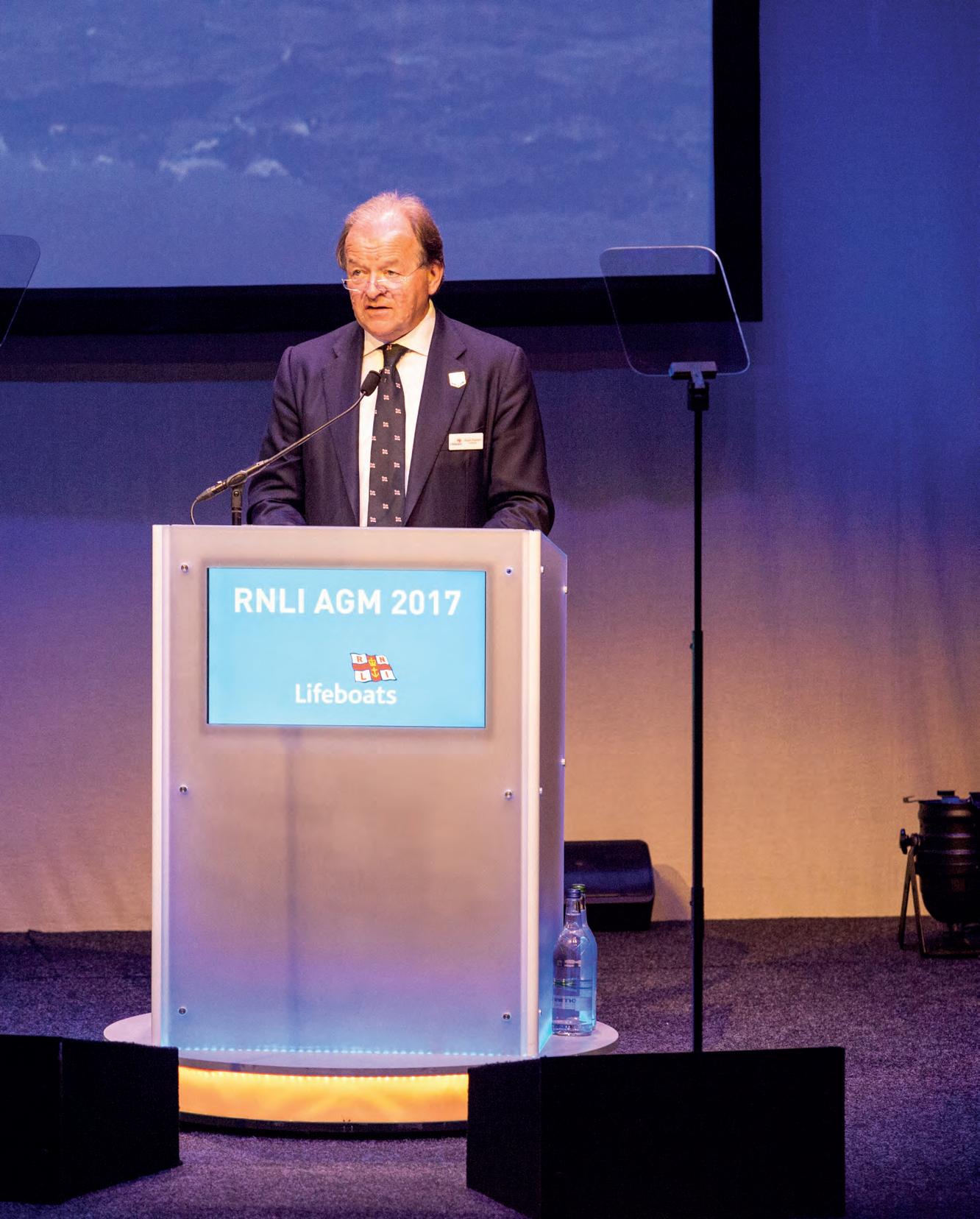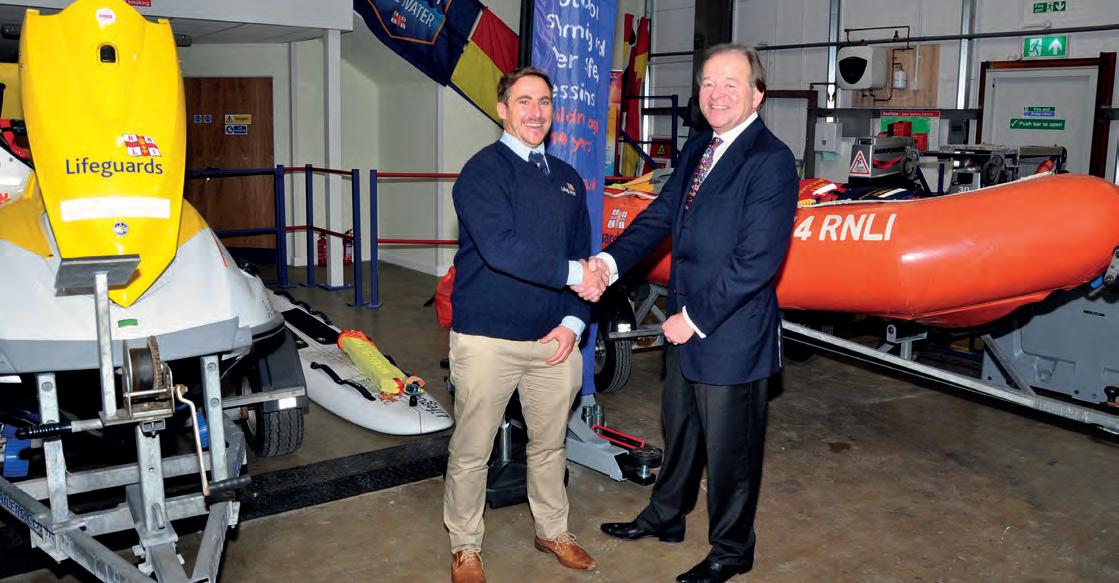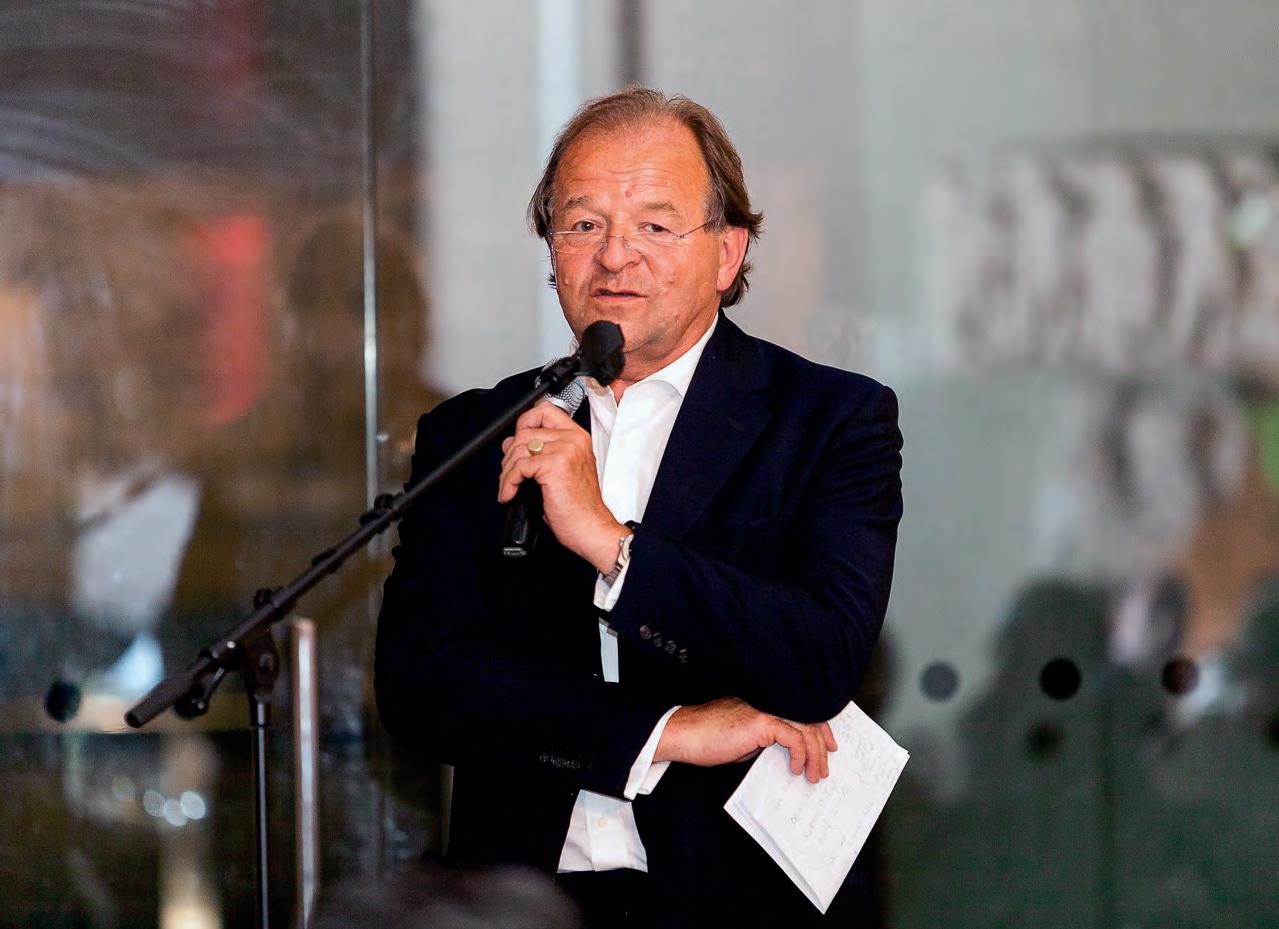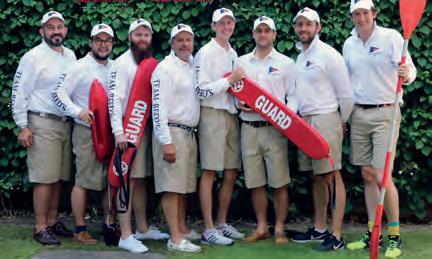
13 minute read
Feature: Stuart Popham QC
Stuart Popham QC
From the City to Philanthropy
Advertisement
When you look at the biography of Stuart Popham QC (Mullens 1972), there is no question that his experience in senior corporate, governmental and regulatory roles is unrivalled. As a keen sailor who has just taken on the Chair of the RNLI, we asked him to navigate his way from his time at Reed’s to a lifetime career in the City… it proves to be a fascinating journey where integrity has been the mainsail!
by Sharmaine Matthews
Convincing a lawyer!
Every year, I have the pleasure of presenting to our Upper Sixth students before they leave School about becoming an OR, explaining the strength and depth of our unique network. To demonstrate this, I hold a short quiz about several of our ‘more public’ ORs; to keep it fresh, this group tends to alternate each year, except for one person – Stuart Popham – who is always mentioned. The reason for this: Stuart is a perfect example of an OR who, regardless of the pressures on his time, never fails to respond to my messages, even the most trivial! As you read on, you will understand why his ability to manage relationships at whatever level is such a positive message for our young leavers.
When I asked Stuart if he would be our lead feature in this year’s magazine, I immediately sensed an unease with speaking about himself, a trait you would never imagine in such a high-profile individual. Indeed, I had to convince him that the focus would not be his stellar career (although it would be remiss not to touch upon it briefly), but instead be an interview to discover how his personal integrity has steered him through life and led to this ‘Reed’s boy’ being described in the national press as the ‘most connected lawyer in the City’ or, indeed, ‘The King of Global Finance’.
Right place, right start
In our conversation, Stuart remembers: ‘my time at Reed’s was always incredibly busy and full, with a positive buzz about the place, the pupils and the staff’ – very much like it is today. This is possibly why he describes himself as ‘more of a sprinter, than a long-distance runner’ and why, post-retirement from Clifford Chance, he has found the energy and drive to take on so many senior directorships. He enjoyed his academic studies at School but says, ‘I was grateful also for being encouraged to take on acting which helped me to project a greater confidence than I had naturally’.
‘I was not ambitious at School,’ Stuart denies, ‘but rather I reacted well to encouragement and support which, in turn, fed an impatience to succeed in whatever task I undertook.’ Perhaps this way of learning helped Stuart to develop his affable and consensual management style that was so ahead of its time in the then commercial, legal and financial services industry. In the words of a colleague: ‘Stuart has become one of the titans of the worldwide legal profession without making enemies.’ An achievement worthy of note bearing in mind the complex, intellectually demanding and, in some instances, controversial situations he has had to deal with. However, importantly, he
Integrity without knowledge is weak and useless, and knowledge without integrity is dangerous and dreadful.
Dr Samuel Johnson (1709–1784)
knows his own foibles and when asked ‘What would someone who doesn’t like you say about you?’ – his reply was short and direct: ‘he likes to take the lead too often’.
Key influences
There can be no doubt that coming from a long line of seafarers (six generations of sea captains in fact), Stuart was already biologically imbued with tenacity and resilience. His father – an engineer – encouraged him to take an interest in business and to be numerate (not always a strong point in lawyers – his words, not mine!). At Southampton University, he discovered a liking for commercial law, which he found shared many similarities with the history lessons he enjoyed at Reed’s, taught by Richard Warnock, Mullens Housemaster.
At Clifford Chance (then Clifford Turner prior to a merger in 1987) Stuart was guided by two mentors: Sir Max Williams who was the perfect example of what the Senior Partner at a law firm should be and how they should behave; and Armel Cates who schooled Stuart in the laws and practice of banking in particular. It was working with these gentlemen that encouraged Stuart to get involved, to be ready to say yes when work was allocated and seek to follow in their footsteps – back to that learning style perhaps! there is always someone, somewhere who has been through a similar experience from which I can learn, even at senior level

Most importantly, Stuart cites two women as his key inspirations: ‘Carolyn – my wife of 40 years – has always encouraged and supported me’ (there are those words again!); and ‘my mother, whose interpersonal skills and ability to memorise personal details of anyone she met, I have managed to inherit to some extent’.
Work/life balance
In holding such pressurised jobs, we were keen to find out how Stuart achieved a work/life balance. He admits, ‘I probably didn’t, although I did try!’ Family, sailing, skiing and seeing horizons have always been important to him in trying to redress the balance.
It was intriguing to hear from Stuart – an astute businessman – that he is never too proud to seek help in difficult times. A believer in a problem shared is a problem halved, Stuart recognises ‘there is always someone, somewhere who has been through a similar experience from which I can learn, even at senior level’. This, he feels, helped him to achieve that better equilibrium at work and at home. For others starting out on their careers, he recommends that work/life balance is something you need to judge by the year, rather than by the month or, worse still, by the day in order to get a true perspective. However, the ability to ‘switch off’ (not just your smart phone) for even a few minutes every day is really important.
Stuart openly admits, ‘the enjoyment of having a variety of jobs, roles and activities in my life is a key motivator to get out of bed each morning, even when I know the day ahead may be challenging’. This can only demonstrate a mind that is inquisitive, questioning and possibly bordering on restless. However, he credits Reed’s for teaching him that if a job is worth doing, it is worth doing well and, never to be under-estimated, the importance of good teamwork. His professional and personal successes undoubtedly come from a deep understanding that clients, colleagues, family and friends rely on you to be there and – just like in any good team - you have to make sure you play your part to the best of your ability’.
Integrity – a trait learned or taught?
Sadly, public trust in the biggest banks and law firms reached an all-time low during the years that Stuart was at the helm of Clifford Chance. When asked how he maintained his integrity – be that in a professional or personal context – during these challenging times, his answer was simple: ‘ultimately it’s about doing the right thing and just knowing that it’s right without really having to think about it, irrespective of any other pressures. You must have the courage to stand up for what you believe’.

As a manager of large teams, he recognises that people may lack integrity because they are unable to appreciate the distinction between what ordinary people regard as honest or not. Therefore, he sees his role to lead by example and to instil in his staff a sense of pride in their company’s reputation, viewing it as an important ‘asset’ that requires continuous vigilance, needs to be defended at all times and takes an age to build and a moment to lose. This standard rings true in all roles he has held, including as special adviser to former British Prime Ministers David Cameron and Gordon Brown when promoting UK industry, right up to his latest as Chair of one of the UK’s largest and much loved charities, RNLI.
Stuart was grateful that during his time in the City, he had to deal with unethical behaviour only on rare occasions, whether that was improper personal behaviour or, though seldom, suggestions of short-cuts akin to ‘the ends justifying the means’. Stuart explains, ‘there is a recognition amongst lawyers and bankers that there have been a few ‘rotten apples’, but only rarely have there been ‘rotten barrels’. He adds, ‘people occasionally need a little guidance to keep on course, but only on rare occasions has there been intentional deviation from the charted course’.
Stuart recalls being faced with a particular dilemma when dealing with an incident of ‘inappropriate behaviour’ by someone whom he had known for many years. He recounts: ‘It would have been easy to ask the person and others involved to apologise and carry on as normal. The more difficult approach was to recognise that the instance was so serious, and likely to become public knowledge, that the right decision was to ask them to leave regardless of any personal connections. This then demonstrated to others that future actions of a similar nature would only result in one thing.”
It is interesting to note at this point perhaps, that Stuart was awarded honourary Queen’s Counsel status in 2011 in ‘recognition of his contribution to the law outside the courtroom’; he obviously made sure this extended to his boardroom too.
As somewhat tongue-in-cheek question, we asked whether it is better to be perfect and late on a task, or imperfect and on time? Stuart’s answer – perhaps not unsurprisingly from a lawyer – was very balanced. He was adamant that ‘the most important element is to ensure that whoever is relying on or expecting the product of the task is aware of when it will be completed/delivered. Obviously it will depend on the circumstances. If you agree a deadline then you should do your best to keep to it and to produce your best. Ensuring that you fully explain what can be, or has been, done will always make such situations easier. And if you need help to achieve the deadline – ask for it’.
At a corporate level, Stuart feels that integrity connotes moral soundness, rectitude and steady adherence to an ethical code which the whole company needs to share. Therefore, ‘ideally, any selection/interview process should seek to establish that all employees or volunteers when joining an organisation have a well-developed set of values. There is then a continuing need to make it absolutely clear that any behaviour that falls short of the expected standards or which threatens the reputation of the organisation will not be tolerated. Actions of leaders should speak at least as loudly as words, and training programmes and clear ground rules should all help’. One could argue that this not only applies to corporates, but to every other walk of life too. I know that I have been fortunate to have achieved what I have, but – in the same vein – it would not have been possible unless I enjoyed each day too.
Good times, bad times
There were always going to be too many highlights in his career for Stuart to mention, but we asked him to let us have his top three anyway! As difficult as this was, he managed to distil them down as follows:
Winning a case in the House of Lords (now the Supreme Court) while an articled clerk (trainee solicitor); Achieving Partnership and then The Senior Partnership at Clifford Chance; Establishing the Clifford Chance Foundation by which the partnership supports charities around the world and an annual award for the charity doing the most to promote access to justice.
However, he was very clear about the bits he did not like about his job: (a) dismissing people even when you know its in their own long term best interest; (b) asking people to continue working even after they’ve worked for 24 hours or longer and (c) determining that you cannot entirely trust your client – back to that integrity issue again!
Stuart’s advice to any OR setting out on their career may not be ground-breaking, but it is reassuring hearing it from someone who has had such an impressive CV: ‘You have a long career ahead of you and enough time to discover what you will enjoy (as no job is really worth doing unless you can obtain sufficient enjoyment from it). So try it out, but if it’s not for you, don’t be afraid to try another. Be true to yourself’.
Setting a new course
In October 2016, Stuart started out on another adventure, taking on the chairmanship of the RNLI having spent seven years on their Council: possibly the most perfect role for such a passionate sailor. He is resolute in knowing what skills he can transfer from his corporate experience to the charity sector: ‘Primarily I have seen my role as a problem solver, a provider of solutions. Additionally, bringing people together to achieve synergies’. Ironically, these skills were recently tested, requiring Stuart to once more rely on his inherent personal standards of integrity to help steer the charity through a period of bad press which – unlike several charities which had experienced the same previously – saw him and his team manage the storm very well.
This is not his first inroad into the Third Sector however: as a former Governor of Birkbeck College, Stuart was known for being passionate about education and providing access to all who want to understand the world; he also was a Director of PlaNet Finance, a charity that promotes microfinance to assist the alleviation of poverty and, of course, he has been a generous and loyal supporter of the Reed’s Foundation.
And what next… well, this article probably screams out that Stuart is not one to rest on his laurels and that the sense of ‘busyness’ he experienced at Reed’s all those years ago, still lives strong. He tells me that his one regret is ‘not being fluent in a number of different languages, and possibly – in another life – becoming a politician or an actor’. Watch this space!
Stuart was incredibly amenable in the putting together of this article but, he did have one request and that was to include the latest RNLI safety message; ‘if you find yourself in the water… just float!’ How could we resist sharing such wise counsel, especially as it leads so aptly into mentioning how fellow OR John Allison (Blathwayt 2001) and a group of Reed’s teachers, the majority of them novice sailors, this summer took on the challenge of the ‘Round the Island Race’ – all in aid of RNLI!

Round the Island Race From left to right: Steve Pope, Terry Ha, Daniel Leckie, Andrew Pascoots, Simon Sweeney (OR), John Allison (OR), Mark Farmer and Will Pope.
Stuart Popham QC
(Mullens 1972)
1965 to 1972
Attends Reed’s School
1972 to 1976
Attends Southampton University LLB & College of Law for Solicitors’ exams
1976
Joins Clifford Chance LLP
1984
Partner at Clifford Chance LLP
2003 to 2011
Senior Partner (Chairman) of Clifford Chance LLP
2005 to 2018
Council Member of Chatham House (Royal Institute of International Affairs)
2008 to 2012
Chairman of TheCityUK
2010 to 2015
Board member of The Barbican Centre Trust
2010 to 2016
Governor of Birkbeck University of London, 2017 made a Fellow
2011
Made Queen’s Counsel (honoris causa)
2011 to date
Vice Chairman of Banking for Europe, The Middle East and Africa (EMEA) at Citigroup, Inc.
2011 to 2016
Independent Non-Executive Director of Legal & General Group Plc
2011 to 2018
Chairman of Chatham House (Royal Institute of International Affairs)
2016 to date
Chairman of RNLI (Royal National Lifeboat Institution)
Other positions
Patron of the Whitehall Industry Group; Member of the Advisory Council, Saïd Business School, University of Oxford; Member of the Confederation of British Industry’s (CBI) International Committee and Chairman of the London Council of the CBI.










